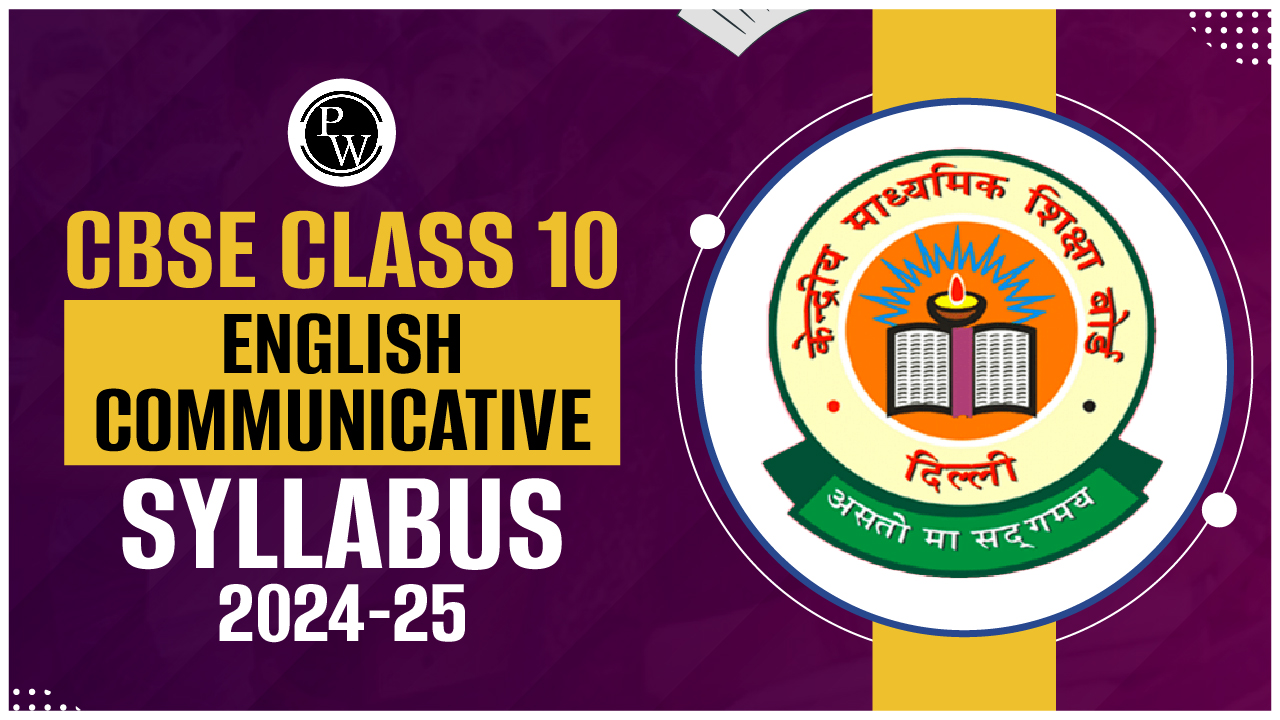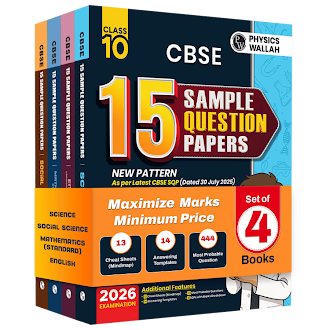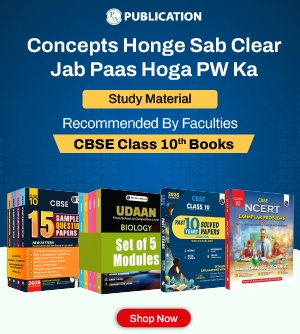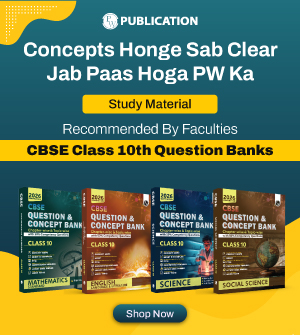CBSE Class 10 English Communicative Syllabus 2025-26

The latest CBSE Class 10 English Communicative Syllabus has been recently released by the Central Board of Secondary Education (CBSE) for the academic year 2025-26. This updated syllabus covers study materials and assessment formats for both the first and second terms of the ongoing academic session. Students preparing for the Class 10 CBSE English exam can easily access the complete syllabus on the CBSE website, cbse.gov.in.
For Class 10 students, it's recommended to go through the CBSE English syllabus, which includes the NCERT Communication English syllabus. The official website offers detailed insights into the curriculum, providing a thorough understanding of the English subject. This syllabus for Class 10 English is utilized by all CBSE-affiliated schools and numerous other state boards. Get the details of the Class 10 English Syllabus below.
CBSE Class 10 English Communicative Syllabus
The CBSE Class 10 English Communicative Syllabus is like a guidebook for candidates who want to excel in English. It covers reading, writing, grammar, and literature to help candidates improve their communication skills and understanding of language. With a practical approach, it gets candidates ready for both exams and everyday conversations. Check out the CBSE Class 10 English Communicative Syllabus from the below table:-
|
CBSE Class 10 English Communicative Syllabus |
|
|
Term 1 |
Term 2 |
|
Reading Section |
|
|
Two unseen passages with a variety of questions to test comprehension, vocabulary, and inference skills. |
Two unseen passages with a variety of questions to test comprehension, vocabulary, and inference skills. |
|
Note-making and summarising. |
Note-making and summarising. |
|
Writing Section |
|
|
Formal and informal letters based on provided situations. |
Article writing on a given topic. |
|
Storywriting is based on a given outline or theme. |
Speech writing for a given occasion. |
|
Short composition on a given topic. |
Informal conversation/dialogue writing. |
|
Grammar |
|
|
Tenses |
Gap filling |
|
Modals |
Sentence reordering |
|
Determiners |
Editing or omission |
|
Active and passive voice |
Sentence transformation |
|
Subject-verb agreement |
Use of determiners, pronouns, and prepositions |
|
Reported speech |
|
|
Literature |
|
|
Textbook: First Flight |
Textbook: Footprints Without Feet (only for schools opting for the textbook) |
|
Prose:
|
Prose:
|
|
Poetry:
|
Supplementary Reader:
|
Check out: CBSE Class 10th Sample Papers
CBSE 10th Exam Pattern 2025: English Language and Literature
CBSE Class 10 English Language and Literature exam pattern 2025 explains how the question paper is divided. It helps students focus on important parts like Reading, Writing & Grammar, and Literature. Each section has its own weightage, making it easier to plan preparation and score well in the exam.
| Sections | Weightage (Marks) |
|---|---|
| Section A: Reading | 20 |
| Section B: Writing and Grammar | 20 |
| Section C: Literature | 40 |
| Total Marks (Theory) | 80 |
| Total Marks (Internal Assessment) | 20 |
| Grand Total | 100 |
Preparation Tips for CBSE Class 10 English Communicative
-
Get Familiar with the Exam Pattern: Begin by understanding the exam pattern, including the marking scheme, types of questions, and allotted time for each section. This will help the candidates plan their preparation strategy effectively.
-
Study the Syllabus: Take some time to go through the entire syllabus provided by CBSE for Class 10 English Communicative.
-
Practice Reading Comprehension: Regularly practice reading comprehension passages to improve reading speed and comprehension skills. Focus on grasping the main idea, identifying supporting details, and answering questions based on the passage.
-
Writing Practise: Dedicate regular time to practice different types of writing tasks such as formal and informal letters, articles, speeches, stories, and dialogues. Pay attention to grammar, vocabulary, and organization of ideas in your writing.
-
Review Grammar Rules: Aspirant should have expertise in grammar rules and concepts such as tenses, modals, active and passive voice, subject-verb agreement, reported speech, determiners, pronouns, prepositions, sentence reordering, gap filling, editing, omission, and sentence transformation.
-
Expand Vocabulary: Work on expanding your vocabulary by reading extensively, maintaining a vocabulary journal, learning new words along with their meanings and usage, and regularly practicing vocabulary exercises.
-
Literature Study: Read and comprehend the prescribed prose and poetry texts from the textbooks. Analyze the themes, characters, plot, and literary devices used in each text.
-
Practice Note-making and Summarising: Improve note-making and summarising abilities by condensing information from passages, articles, or speeches into clear and concise notes or summaries.
-
Solve Mock Tests and Sample Papers: Familiarise yourself with the exam format, and improve time management, and preparation level by solving mock tests and previous years' question papers. Additionally, solve sample papers to get acquainted with different types of questions.
-
Regular Revision and Self-assessment: Revise the topics regularly and assess understanding by solving practice exercises and self-assessment quizzes. Identify strengths and weaknesses and work on improving them.
Check out: CBSE Class 10th Question Banks
Reference Book for CBSE Class 10 English
NCERT English Books are important not just for Class 10 students, but also for those preparing for various entrance and competitive exams. They help in developing a strong understanding of subjects. To make things easier for all candidates, the Physics Wala team has put together a combo package of NCERT English Previous Year Questions. This package helps aspirants identify their weak areas and is value for money to all. To get this useful package directly from the PW Store, just click the link below.
CBSE Class 10 Sample Papers English for 2026 Board Exam
CBSE Class 10 English Communicative Syllabus FAQs
Q1. What is the CBSE Class 10 English Communicative Syllabus?
Ans. The CBSE Class 10 English Communicative Syllabus outlines the topics and learning objectives for the English subject, including reading, writing, grammar, and literature.
Q2. How is the CBSE Class 10 English syllabus structured?
Ans. The syllabus is typically divided into sections covering reading comprehension, writing tasks, grammar concepts, and prescribed literature texts.
Q3. What are the main components of the CBSE Class 10 English syllabus?
Ans. The main components include reading comprehension passages, writing tasks such as letters, articles, and stories, grammar topics like tenses and reported speech, and prescribed prose and poetry texts.
Q4. How can students use the syllabus to identify their strengths and weaknesses?
Ans. By comparing their understanding and performance with the topics outlined in the syllabus, students can identify areas where they need more practice or assistance.
Q5. Are there any resources available to supplement the syllabus?
Ans. Yes, there are various study materials, guidebooks, practice papers, and online resources available to help students supplement their learning as per the syllabus.












